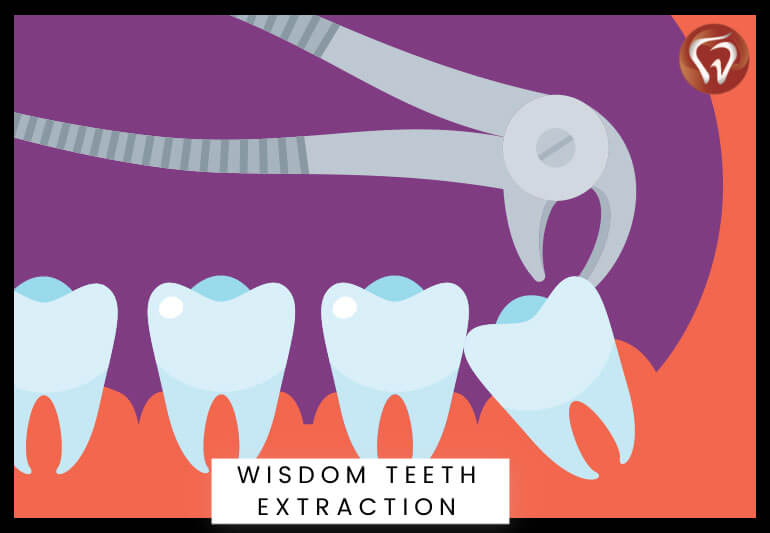Wisdom teeth, also known as third molars, are the last set of teeth to develop in the human mouth. They typically emerge between the ages of 17 and 20, but some people may not develop them at all. Wisdom teeth are located at the back of the mouth, behind the second molars, and can cause problems if they do not fully emerge or if they become impacted.
An impacted wisdom tooth is one that does not have enough room to fully emerge from the gums due to lack of space in the jaw. Impacted wisdom teeth can cause a variety of problems, including pain, infection, and damage to adjacent teeth. They can also make it difficult to properly clean the teeth and gums, which can lead to dental decay and gum disease. When wisdom teeth become problematic, the most common solution is to extract them. This procedure is typically performed by an oral surgeon or a general dentist. It can be done under local anesthesia, sedation, or general anesthesia, depending on the individual case and the preference of the patient.
The recovery time after wisdom teeth extraction varies depending on the individual case, but it usually takes about 2- 3 days for swelling to subside and 1 week for full recovery. Pain and discomfort can be managed with over-the-counter pain medication and ice packs applied to the cheeks.It is also important to follow proper aftercare instructions provided by the dentist, such as avoiding solid foods and smoking, drinking through a straw, and not manipulating the extraction site with your tongue or fingers.
In general, wisdom teeth extraction is a common and safe procedure. It can prevent the development of more serious problems in the future and improve the overall health of the patient.
Wisdom teeth extractions can have several benefits which include:
- Relief of pain and discomfort: Impacted wisdom teeth can cause pain, swelling, and infection in the gums and surrounding areas. Extracting these teeth can provide immediate relief from these symptoms.
- Prevention of infection: Impacted wisdom teeth can trap food and bacteria, leading to infection and decay. Extracting these teeth can help prevent the development of serious oral infections.
- Preservation of adjacent teeth: Impacted wisdom teeth can push against and damage adjacent teeth, leading to crowding, shifting, and bite problems. Extracting these teeth can help preserve the alignment and function of adjacent teeth.
- Improved oral hygiene: Wisdom teeth can make it difficult to properly clean the back of the mouth, leading to plaque buildup, tartar, and decay. Extracting these teeth can make it easier to maintain good oral hygiene and prevent halitosis.
- Aesthetics: Wisdom teeth can cause the misalignment of the teeth leading to a change in the overall appearance of the smile.
It’s important to note that not all wisdom teeth need to be extracted, but the dentist will evaluate each case individually, and recommend extraction if it is deemed necessary.
After the procedure, it is essential to take proper care of the extraction site to promote healing and prevent complications. Here are some tips for aftercare of wisdom teeth extraction:
- Bite down on a gauze pad: After the procedure, the dentist will place a gauze pad over the extraction site and ask you to bite down on it to help stop the bleeding for at least 30 minutes. It is important to change the gauze as needed, if bloody.
- Apply ice packs: Applying ice packs to the extraction site can help to reduce swelling, pain, and bleeding. Use an ice pack for 20 minutes at a time, and then remove it for 20 minutes. Repeat this cycle for the first 24 hours after the procedure.
- Avoid smoking: Smoking can interfere with the healing process, causing dry socket, infection, and delayed healing. Avoid smoking for at least 24 hours after the procedure.
- Avoid drinking through a straw: Drinking through a straw can create suction in the mouth, which can dislodge the blood clot and cause a dry socket. Avoid drinking through a straw for at least 24 hours after the procedure.
- Eat soft foods: For the first day or two after the procedure, it’s best to stick to soft foods such as yogurt, pudding, ice cream, and soup. Gradually add solid foods to your diet as the extraction site heals.
- Take pain medication as directed: If prescribed, take pain medication as directed by your dentist. Over-the-counter pain relievers such as ibuprofen and acetaminophen can also be used for pain management.
- Follow up with your dentist: Be sure to schedule a follow-up appointment with your dentist as directed. They will want to check on the healing process and make sure there are no complications.
- Rest: Rest is important to promote healing after wisdom teeth removal. Avoid strenuous activity and physical exertion for the first 24-48 hours which can increase blood flow, leading to increased bleeding in the surgical area. After that, light exercise such as walking or gentle stretching can be resumed, but it is best to avoid heavy exercise for the first week or two to allow adequate time for healing.
- Using an antibacterial rinse after wisdom teeth removal is recommended by some dental professionals as a way to promote healing and prevent infections. Antibacterial rinses can help control bacteria in the mouth and reduce the risk of infection.
By following these aftercare tips, you can help to promote healing and prevent complications after wisdom teeth extraction. Remember to always consult with your dentist or oral surgeon if you have any questions or concerns about the recovery process.

